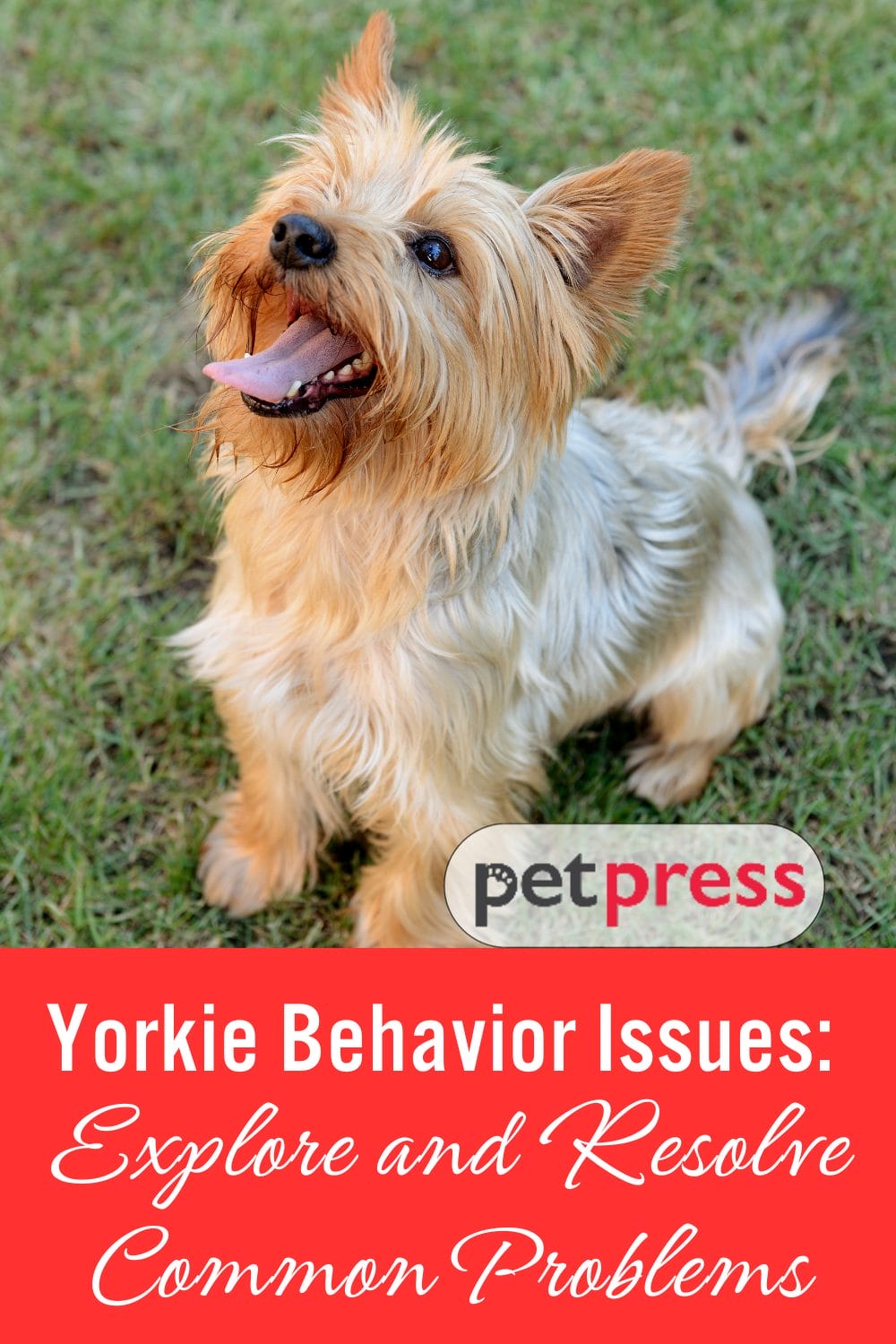
Unraveling the mysteries of Yorkie behavior issues can feel like interpreting an alien language. Let’s embark on this enlightening journey together, unveiling the reasons behind your little furball’s antics and exploring effective strategies to address these common problems.
Yorkshire Terriers, or “yorkies,” are beloved for their spirited personalities and adorable appearance. However, like any breed, they can exhibit behavior issues that may challenge their owners.
In this guide, we’ll delve into various Yorkie behavior issues, offering insights and practical solutions to help you nurture a positive and fulfilling relationship with your pint-sized friend.

Interesting Facts About Yorkies
Yorkies are known for their fierce yet charming demeanor, but there’s more to these tiny warriors than meets the eye.
Despite their small size, Yorkies carry a big dog attitude and are seldom aware of their petite stature. They were initially bred to catch rats in mines and mills in 19th-century England, which explains their inherent feisty nature.
Moreover, they’re an intelligent breed with a streak of stubbornness, making them both fun and challenging to train. Their luxurious coat is akin to human hair rather than typical dog fur, a unique trait that often requires regular grooming.
Yorkies are also known for their longevity, typically 13 to 16 years, much longer than many larger dog breeds. However, the most endearing quality of Yorkies is their unwavering loyalty and affection towards their human companions, making them not just pets but cherished family members.

Understanding Yorkie Behavior Issues
Aggression and Dominance
Aggressive behavior in Yorkies can stem from various sources, including fear, possessiveness, or a desire to establish dominance. It’s crucial to identify the root cause to address the issue effectively. Training and socialization can play a vital role in curbing aggression.
Aggression can often be a manifestation of anxiety or discomfort. Providing a safe and secure environment for your Yorkie and positive reinforcement can help mitigate this behavior.
Separation Anxiety
Yorkies are known for their affectionate nature and can develop separation anxiety when left alone for extended periods. This may lead to destructive behavior or excessive barking. Establishing a consistent routine and incorporating interactive toys can help alleviate this anxiety.
Excessive Barking
While Yorkies have big personalities, their small size sometimes matches their loud barks. Various factors, such as boredom, anxiety, or a need for attention, can trigger excessive barking.
Engaging your Yorkie in stimulating activities and providing mental enrichment can help reduce this behavior.
Housebreaking Challenges
Yorkies, like many small breeds, may face difficulties with housebreaking. Patience, positive reinforcement, and establishing a regular potty schedule are critical components in overcoming this hurdle. Consistency in training methods is crucial for success.
Fear and Timidity
Some Yorkies may exhibit shyness or fearfulness, especially in unfamiliar environments or around strangers. Gradual exposure and positive experiences can help build their confidence over time. Avoiding forceful or harsh training methods is essential to gaining their trust.
Stubbornness and Independence
Yorkies are known for their independent streaks, which can sometimes be mistaken for stubbornness. Positive reinforcement and consistent training techniques can help channel their independence into positive behaviors.

5 Best Ways to Mitigate Yorkie Behavior Issues
Mitigating Yorkie behavior issues requires patience, consistency, and understanding. Here are some strategies that can prove effective:
1. Positive Reinforcement:
Rewarding good behavior is a powerful way to shape your Yorkie’s actions. Use treats, praise, or playtime as rewards when your Yorkie behaves well.
2. Consistent Training:
Consistency is critical in training Yorkies. Ensure all family members follow the same rules and commands to avoid confusing your dog.
3. Early Socialization:
Exposing your Yorkie to various people, environments, and other animals early can help reduce fear and anxiety. It can also stimulate their mental health and prevent aggressive tendencies.
4. Provide mental and Physical Stimulation:
Yorkies have high energy levels and sharp minds. Regular exercise and mental stimulation through games, puzzles, or training sessions can help curb destructive behaviors.
5. Professional Help:
If you’re struggling to manage your Yorkie’s behavior, consider seeking assistance from a professional dog trainer or behaviorist. They can provide personalized strategies based on your Yorkie’s needs and tendencies.
Remember, every dog is unique, and what works for one might not work for another. Patience and understanding are crucial throughout your Yorkie’s behavior modification journey.

Conclusion
Understanding and addressing Yorkie behavior issues requires patience, consistency, and a deep understanding of your furry companion. By implementing the strategies outlined in this guide, you can foster a strong bond with your Yorkie and ensure a happy, well-adjusted pet.

FAQs (Frequently Asked Questions)
How can I prevent my Yorkie from becoming aggressive?
To prevent aggression, early socialization is crucial. Expose your Yorkie to various environments, people, and other dogs in a controlled and positive manner. Additionally, seek professional training if you notice signs of aggression.
What are some effective toys to combat separation anxiety?
Interactive toys that dispense treats or engage your Yorkie’s problem-solving skills can effectively alleviate separation anxiety. Look for toys that provide mental stimulation and keep your pup occupied.
Is crate training suitable for Yorkies with housebreaking challenges?
Yes, crate training can be a valuable tool in housebreaking Yorkies. It provides a secure space for them and helps establish a routine. Ensure the crate is appropriately sized and comfortable for your Yorkie.
How can I help my timid Yorkie gain confidence?
Expose your Yorkie to new experiences gradually, always in a positive and controlled manner. Offer praise and rewards for brave behavior. Avoid rushing or forcing them into situations that may cause undue stress.
What should I do if my Yorkie refuses to follow commands?
Maintain patience and use positive reinforcement techniques. Keep training sessions short and enjoyable. Consistency is critical, so reinforce commands regularly and reward your Yorkie for good behavior.
Are there specific activities that can help channel my Yorkie’s independence positively?
Engage your Yorkie in activities stimulating their minds and bodies, such as puzzle toys or interactive games. Additionally, consider enrolling them in agility or obedience classes to provide structured outlets for their energy.
- Can Pets Sense Pregnancy in Humans? - October 1, 2024
- 6 Unusual Pets for Adventurous Owners: From Tarantulas to Pigs - September 30, 2024
- Feline Hyperthyroidism: Early Signs and Modern Treatments - September 30, 2024


GIPHY App Key not set. Please check settings